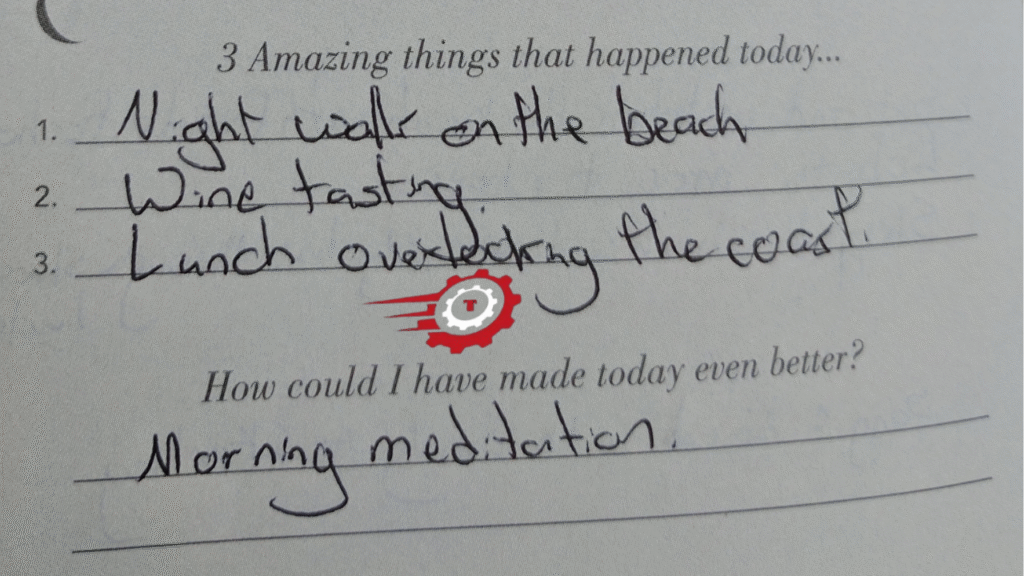Have you ever ended your day feeling like something was missing? Maybe your to-do list wasn’t finished. Maybe you snapped at someone. Or maybe nothing went wrong, but it still felt “just okay.” That’s where a simple question can change everything: “How could I have made today even better?” Asking this question isn’t about guilt or regret. It’s about learning, growing, and building small habits that make every day feel more meaningful.
Why Think About a Better Day?
Most of us rush through life. Morning alarms. Commutes. Work. Errands. Dinner. Netflix. Sleep. Repeat. In all this busyness, we rarely pause to check in with ourselves. But reflecting on your day—even for a few minutes—can help you:
- Spot what went well (so you can do more of it)
- Notice what didn’t (and how to avoid it next time)
- End the day feeling calmer and more in control
When you ask, “How could I have made today even better?” it’s not about judging yourself harshly. It’s about being curious. You’re asking your brain to find gentle, realistic answers: maybe I could have been more patient, taken a short walk, or sent that kind text. These insights are like seeds. If you plant them daily, they grow into better habits, stronger relationships, and happier days.
Easy Steps to Reflect Every Night
You don’t need a fancy journal or an hour of free time to reflect. Start small. Set aside 5 minutes before bed. Sit somewhere quiet, take a few deep breaths, and ask yourself:
What went well today? What didn’t? How could I have made today even better?
Write down whatever comes to mind. Don’t overthink it. Maybe you realize you spent too much time scrolling. Or you skipped lunch and felt cranky. Or maybe you notice you made someone smile, and that felt good.
Over time, these reflections become a guidebook for living more intentionally. You’re training your brain to notice patterns and adjust gently.
Ask Yourself One Simple Question
The beauty of “How could I have made today even better?” lies in its simplicity. One question opens doors to better choices, deeper gratitude, and kinder self-talk.

Write Down Your Thoughts
Our minds are noisy places. Thoughts bounce around and disappear. Writing them down helps you see them clearly. Keep a small notebook by your bed. Each night, jot down your answers. You might write:
- “I could have taken a break instead of pushing through fatigue.”
- “I wish I had called Mom instead of texting.”
- “Next time, I’ll prepare lunch to avoid fast food.”
This isn’t about fixing everything at once. It’s about noticing and nudging yourself toward small changes.
Focus on Small Wins
Many people think improvement means huge life changes. But the truth? Tiny wins matter most. Did you drink more water today? Smile at a stranger? Avoid a sarcastic comment? Celebrate that. Small wins stack up. Over weeks and months, they shape a healthier, happier you.
Even if your day felt chaotic, chances are there was at least one small thing you did well. Write it down. Feel good about it.
What If I Had a Bad Day?
Bad days happen. Maybe you argued with a loved one. Or you didn’t finish important tasks. Or you just felt “off.” Here’s the key: don’t beat yourself up. Reflection isn’t punishment—it’s learning.
Ask gently: “What would I do differently if I could redo today?” Maybe the answer is “Take a 5-minute walk to clear my head” or “Pause before replying in anger.” Tomorrow is another chance to try.
Simple Habits for a Better Tomorrow
Reflection is powerful, but pairing it with small habits can supercharge results. Here are a few habits to help you build better days:
- Start your morning with intention. Spend 2 minutes asking, “What’s one thing I want to feel proud of tonight?”
- Take short breaks during the day to breathe and reset.
- End your evening with gratitude (we’ll talk more about this next).
When you stack these micro-habits, you create a life where better days aren’t accidents—they’re routine.
Why Gratitude Makes Days Better
Science shows gratitude rewires your brain for positivity. When you focus on what went right—even in a tough day—you train your mind to look for good. This doesn’t mean ignoring challenges. It means balancing them with appreciation.
Every night, list three things you’re grateful for. They don’t have to be big. Maybe it’s:
- A delicious cup of coffee
- A friend’s supportive text
- The sunset you noticed on your drive home
This simple act reduces stress, improves sleep, and boosts mood.
Say Thanks for 3 Things
As you reflect on your day, write down or say out loud three things you’re thankful for. This primes your brain to end the day positively instead of replaying mistakes.

Share Gratitude With Someone
Take it a step further. Text or tell someone why you appreciate them. Maybe: “Thanks for listening today. It meant a lot.” This not only makes their day better—it strengthens your connection and reinforces your own gratitude.
Reflect Without Feeling Guilty
It’s easy to turn reflection into self-criticism. Don’t. If your answer to “How could I have made today even better?” feels harsh, reframe it. Instead of “I was lazy,” say, “Next time I’ll take a short walk to boost my energy.”
Be your own coach, not your critic.
Start With Just 5 Minutes a Day
If you’re overwhelmed, begin small. Five quiet minutes before bed can shift your mindset. Over time, reflection feels less like a task and more like a gift to yourself.
The Power of Asking Better Questions
Your brain loves answering questions. So give it good ones. Instead of “Why was today so bad?” try “What’s one thing I learned today?” or “How could I have made today even better?” Better questions lead to better answers—and, ultimately, better days.
The Bottom Line
Life isn’t about being perfect. It’s about growing, little by little. When you pause each night and ask, “How could I have made today even better?” you open a door to kinder self-awareness, smarter choices, and a calmer tomorrow.
Start tonight. Grab a notebook. Reflect. Be curious. Be kind. And remember: tomorrow is a fresh chance to try again.

